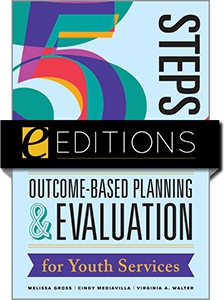
Primary tabs
You don't need to be an ALA Member to purchase from the ALA Store, but you'll be asked to create an online account/profile during checkout to proceed. This Web Account is for both Members and non-Members. Note that your ALA Member discount will be applied at the final step of the checkout process.
If you are Tax-Exempt, please verify that your account is currently set up as exempt before placing your order, as our new fulfillment center will need current documentation. Learn how to verify here.
- Description
- Table of Contents
- About the authors
This powerful book focuses on the organizational context specific to youth services in public libraries, walking readers through concrete steps to use outcome-based planning and evaluation to achieve their goals while effectively promoting the library.
Outcome-based planning and evaluation (OBPE), with its straightforward approach built on a flexible framework, is the perfect model to enable youth services professionals to deliver effective services regardless of uncertainties. An outcome-based approach can help youth services stay grounded in producing desired outcomes with and for youth through responsive programs, services, and processes that can adapt to changing conditions. Clarifying the relationship between planning, program development, and evaluation, the five simple steps outlined in this book will help youth services staff conduct solid community assessments and integrate OBPE into their work. Inside its pages you will learn
- a short history of OBPE and its evolution;
- why it is crucially important to involve youth in all stages of program development, with guidance on navigating challenges;
- how to think about planning as the need to react quickly, whether due to natural or human-made disasters, changing demographics, or economic swings;
- the five steps of OBPE, from gathering information about your community and determining the outcomes that will serve your community to crafting accurate outcome statements, developing an evaluation plan, and maximizing the results of successful outcome-based programs;
- how to visualize the steps needed to successfully plan, implement, and evaluate an outcome-based program, using the template included in the book;
- ways to share your data to let people know the library’s important role in the community; and
- additional useful tools to bolster your work, including environmental scan forms and ideas for creating relevant family storytimes.
Preface
Introduction
Part I An Introduction to Outcome Planning and Evaluation in Youth Services
Chapter 1 Thinking about Planning in Times of Change
Chapter 2 Involving Youth in Outcome Planning and Evaluation
Chapter 3 Defining Outcomes and OBPE
Chapter 4 Designing the OBPE Project
Part II The Five-Step OBPE Model
Chapter 5 Step 1: Gathering Information
Chapter 6 Step 2: Determining Outcomes
Chapter 7 Step 3: Developing Programs and Services
Chapter 8 Step 4: Conducting Evaluations
Chapter 9 Step 5: Leveraging the Library’s Role
Conclusion: And Finally . . .
Appendixes
- Appendix A Environmental Scan: External (Community) Factors
- Appendix B Blank OBPE Project Planning Template
- Appendix C Gantt Chart Example: Books and Bites Community Garden Time Line
- Appendix D Environmental Scan: Internal (Library) Factors
- Appendix E “Books and Bites” Sample Family Storytime Programs
References
About the Authors
Index
Melissa Gross
Melissa Gross is a professor in the School of Information at Florida State University and past president of the Association for Library and Information Science Education (ALISE). She received her PhD in library and information science from the University of California, Los Angeles (UCLA) in 1998, received the prestigious American Association of University Women Recognition Award for Emerging Scholars in 2001, and received the ALISE Award for Professional Contribution to Library and Information Science Education in 2019. Dr. Gross teaches and conducts research in the areas of information-seeking behavior, information literacy, library program and service evaluation, and information resources for youth.
Cindy Mediavilla
Cindy Mediavilla is an author and library consultant who recently retired from the California State Library as well as the UCLA Department of Information Studies. She is also a former public librarian. Her areas of expertise include community assessment, outcome-based planning and evaluation, after-school homework programs, library residency programs, and grant writing. Her most recent books include Libraries & Gardens: Growing Together (ALA Editions, 2019), coauthored with Carrie Banks. Cindy’s MLS and PhD are both from UCLA.
Virginia A. Walter
Virginia A. Walter holds an MLS degree from the University of California at Berkeley and a PhD in public administration from the University of Southern California. She is a past president of the Association for Library Service to Children (ALSC) and a former public librarian and professor of information studies at UCLA. She has written more than ten professional and academic monographs, two books for young people, and numerous articles. Her other LIS books include Young Activists and the Public Library: Facilitating Democracy (ALA Editions, 2020).


